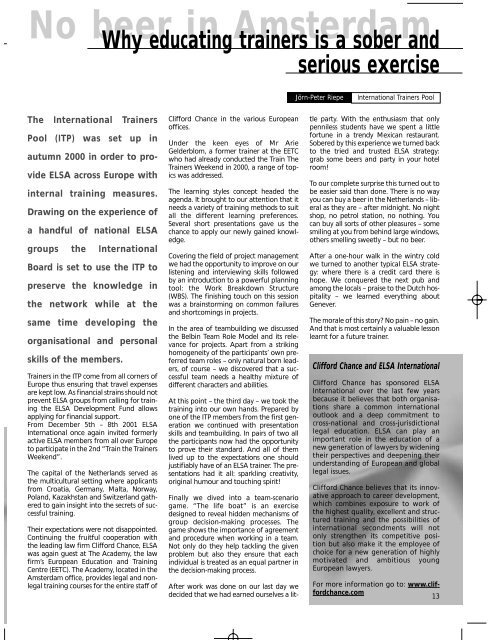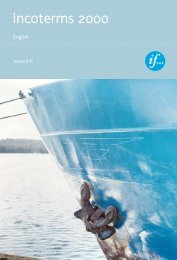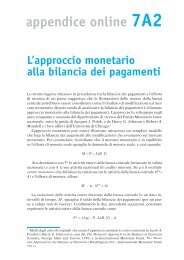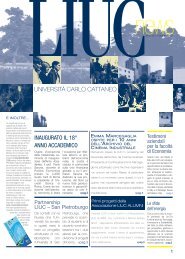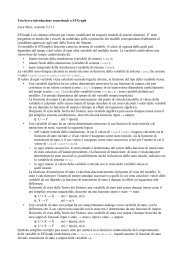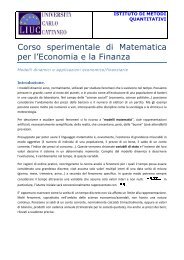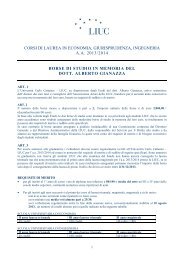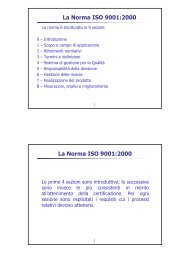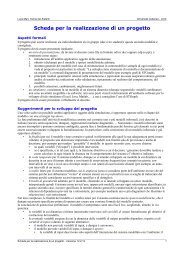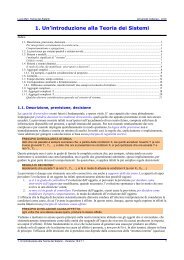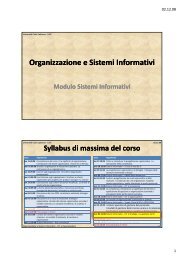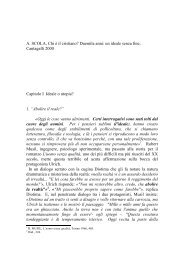The ELSA
The ELSA
The ELSA
- No tags were found...
Create successful ePaper yourself
Turn your PDF publications into a flip-book with our unique Google optimized e-Paper software.
No beer in AmsterdamWhy educating trainers is a sober andserious exerciseJörn-Peter RiepeInternational Trainers Pool<strong>The</strong> International TrainersPool (ITP) was set up inautumn 2000 in order to provide<strong>ELSA</strong> across Europe withinternal training measures.Drawing on the experience ofa handful of national <strong>ELSA</strong>groups the InternationalBoard is set to use the ITP topreserve the knowledge inthe network while at thesame time developing theorganisational and personalskills of the members.Trainers in the ITP come from all corners ofEurope thus ensuring that travel expensesare kept low. As financial strains should notprevent <strong>ELSA</strong> groups from calling for trainingthe <strong>ELSA</strong> Development Fund allowsapplying for financial support.From December 5th – 8th 2001 <strong>ELSA</strong>International once again invited formerlyactive <strong>ELSA</strong> members from all over Europeto participate in the 2nd “Train the TrainersWeekend”.<strong>The</strong> capital of the Netherlands served asthe multicultural setting where applicantsfrom Croatia, Germany, Malta, Norway,Poland, Kazakhstan and Switzerland gatheredto gain insight into the secrets of successfultraining.<strong>The</strong>ir expectations were not disappointed.Continuing the fruitful cooperation withthe leading law firm Clifford Chance, <strong>ELSA</strong>was again guest at <strong>The</strong> Academy, the lawfirm’s European Education and TrainingCentre (EETC). <strong>The</strong> Academy, located in theAmsterdam office, provides legal and nonlegaltraining courses for the entire staff ofClifford Chance in the various Europeanoffices.Under the keen eyes of Mr ArieGelderblom, a former trainer at the EETCwho had already conducted the Train <strong>The</strong>Trainers Weekend in 2000, a range of topicswas addressed.<strong>The</strong> learning styles concept headed theagenda. It brought to our attention that itneeds a variety of training methods to suitall the different learning preferences.Several short presentations gave us thechance to apply our newly gained knowledge.Covering the field of project managementwe had the opportunity to improve on ourlistening and interviewing skills followedby an introduction to a powerful planningtool: the Work Breakdown Structure(WBS). <strong>The</strong> finishing touch on this sessionwas a brainstorming on common failuresand shortcomings in projects.In the area of teambuilding we discussedthe Belbin Team Role Model and its relevancefor projects. Apart from a strikinghomogeneity of the participants’ own preferredteam roles – only natural born leaders,of course – we discovered that a successfulteam needs a healthy mixture ofdifferent characters and abilities.At this point – the third day – we took thetraining into our own hands. Prepared byone of the ITP members from the first generationwe continued with presentationskills and teambuilding. In pairs of two allthe participants now had the opportunityto prove their standard. And all of themlived up to the expectations one shouldjustifiably have of an <strong>ELSA</strong> trainer. <strong>The</strong> presentationshad it all: sparkling creativity,original humour and touching spirit!Finally we dived into a team-scenariogame. “<strong>The</strong> life boat” is an exercisedesigned to reveal hidden mechanisms ofgroup decision-making processes. <strong>The</strong>game shows the importance of agreementand procedure when working in a team.Not only do they help tackling the givenproblem but also they ensure that eachindividual is treated as an equal partner inthe decision-making process.After work was done on our last day wedecided that we had earned ourselves a littleparty. With the enthusiasm that onlypenniless students have we spent a littlefortune in a trendy Mexican restaurant.Sobered by this experience we turned backto the tried and trusted <strong>ELSA</strong> strategy:grab some beers and party in your hotelroom!To our complete surprise this turned out tobe easier said than done. <strong>The</strong>re is no wayyou can buy a beer in the Netherlands – liberalas they are – after midnight. No nightshop, no petrol station, no nothing. Youcan buy all sorts of other pleasures – somesmiling at you from behind large windows,others smelling sweetly – but no beer.After a one-hour walk in the wintry coldwe turned to another typical <strong>ELSA</strong> strategy:where there is a credit card there ishope. We conquered the next pub andamong the locals – praise to the Dutch hospitality– we learned everything aboutGenever.<strong>The</strong> morale of this story? No pain – no gain.And that is most certainly a valuable lessonlearnt for a future trainer.Clifford Chance and <strong>ELSA</strong> InternationalClifford Chance has sponsored <strong>ELSA</strong>International over the last few yearsbecause it believes that both organisationsshare a common internationaloutlook and a deep commitment tocross-national and cross-jurisdictionallegal education. <strong>ELSA</strong> can play animportant role in the education of anew generation of lawyers by wideningtheir perspectives and deepening theirunderstanding of European and globallegal issues.Clifford Chance believes that its innovativeapproach to career development,which combines exposure to work ofthe highest quality, excellent and structuredtraining and the possibilities ofinternational secondments will notonly strengthen its competitive positionbut also make it the employee ofchoice for a new generation of highlymotivated and ambitious youngEuropean lawyers.For more information go to: www.cliffordchance.com13


